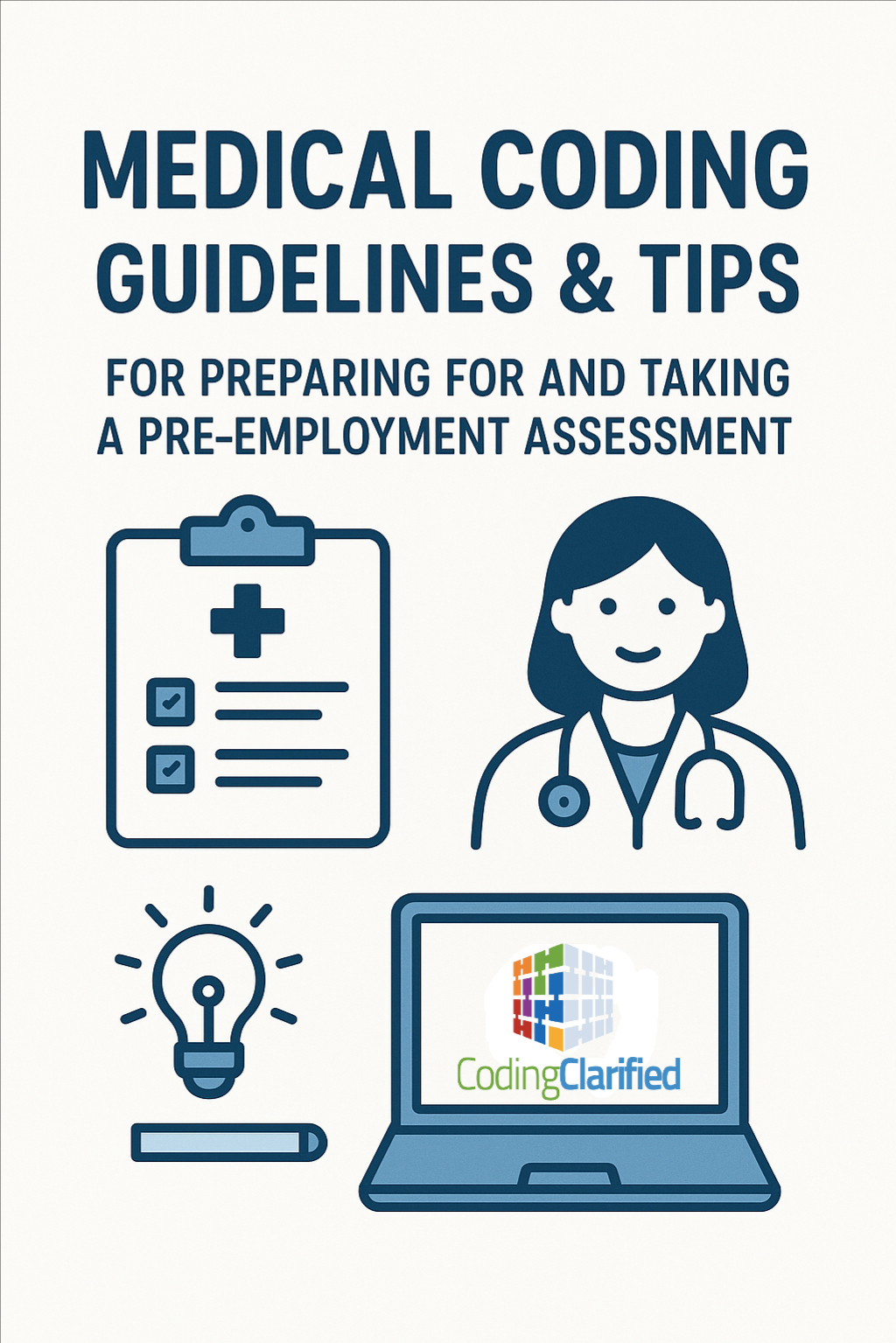Guidelines & Tips for Preparing for and Taking a Pre-Employment Assessment in Medical Coding
Medical coders often face pre-employment assessments as part of the hiring process. These assessments help employers evaluate coding knowledge, problem-solving ability, and readiness to apply coding guidelines in real-world scenarios. Knowing how to prepare and approach them can make a significant difference in landing the job.
Why Pre-Employment Assessments Matter
Pre-employment assessments are not just tests of your memory—they are designed to measure your coding accuracy, compliance with official guidelines, and critical thinking under time constraints. Employers use them to:
-
Ensure candidates can apply ICD-10-CM, CPT, and HCPCS guidelines.
-
Verify attention to detail, since small coding errors can impact reimbursement and compliance.
-
Assess time management skills, which are essential in production-based environments.
Preparation Guidelines
Review the Coding Guidelines
-
ICD-10-CM Official Guidelines: Pay attention to sequencing rules, laterality, and combination coding.
-
CPT Guidelines: Focus on surgical coding, modifiers, and special procedures.
-
HCPCS Level II: Refresh knowledge on common supply and service codes.
-
Compliance Standards: Remember HIPAA, OIG, and documentation requirements.
ICD-10 2026 guidelines https://www.cms.gov/files/document/fy-2026-icd-10-cm-coding-guidelines.pdf
Practice with Real Case Scenarios
-
Use AAPC or AHIMA practice exams.
-
Code mock outpatient and inpatient scenarios.
-
Review specialty-specific coding (E/M, surgery, anesthesia, etc.) based on the type of job.
Brush Up on Modifiers
Modifiers are a frequent part of assessments. Know when to apply modifier 25, 59, 26, TC, and HCPCS-specific modifiers.
CPT Medical Modifiers https://codingclarified.com/cpt-medical-modifiers/
Medical Coding Anatomical Modifiers https://codingclarified.com/medical-coding-anatomical-modifiers/
Strengthen Medical Terminology & Anatomy Knowledge
A strong foundation in terminology and anatomy helps in quickly recognizing correct code assignments without excessive reference checking.
Time Yourself During Practice
Most pre-employment assessments are timed. Practice coding under a set limit (e.g., 60–90 minutes) to build speed without sacrificing accuracy.
Test-Taking Tips
Read Instructions Carefully
Employers may provide specific rules—for example, “Code to the highest level of specificity” or “Do not use unspecified codes.” Missing these can cost points.
Tackle Easier Questions First
Don’t get stuck on one complex case. Answer what you know, then return to the more difficult items.
Use Your Manuals Efficiently
-
Tab and highlight your ICD-10-CM, CPT, and HCPCS books.
-
Familiarize yourself with the index and guidelines sections.
-
Know where to quickly locate anatomy charts, appendices, and modifier lists.
Watch Out for Traps
-
Be cautious with unspecified codes unless documentation clearly supports no further detail.
-
Pay attention to sequencing and “code first”/“use additional code” notes.
Manage Time Wisely
If the assessment is 60 minutes with 30 questions, spend no more than 2 minutes per question, then circle back.
Stay Calm and Professional
Some assessments may also include a soft-skills component (communication or professionalism questions). Treat every part as a reflection of your ability to perform in a healthcare setting.
After the Assessment
Review Your Performance
Even if you don’t receive immediate results, reflect on what areas you found challenging.
Follow Up with the Employer
Send a thank-you email expressing enthusiasm for the role and willingness to clarify or expand on your assessment performance.
Keep Practicing
Whether you pass or need improvement, consistent practice keeps your skills sharp for the next opportunity.
Pre-employment assessments can feel intimidating, but with solid preparation, guideline review, and strong time management, you can demonstrate your coding expertise and stand out as a candidate. Remember, these assessments are not meant to trick you—they are tools employers use to confirm your readiness for the important role of ensuring accurate, compliant coding.

